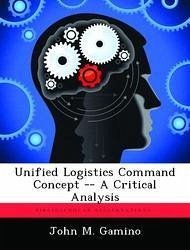The study examines the military worth of the Unified Logistics Command concept as proposed by the Blue Ribbon Defense Panel in July 1970. To establish a frame of reference, the author establishes an overview of the scope and complexity of defense logistics operations, and notes that the current critical climate for all things "military" has historical precedents in the post World War II and post Korean War periods. The author identifies the themes of "reducing duplication and waste" and the "need for increasing efficiency" as being recurrent ones of the various government and defense review commissions and panels since World War II. The history of armed forces unification is traced from its conceptual phase through the late 1960's in order to determine those areas in which logistics was an impetus to centralization.
Hinweis: Dieser Artikel kann nur an eine deutsche Lieferadresse ausgeliefert werden.
Hinweis: Dieser Artikel kann nur an eine deutsche Lieferadresse ausgeliefert werden.








